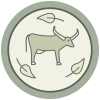
Recycling: more recycling means agricultural production with lower economic and environmental costs
Waste is a human concept – it does not exist in natural ecosystems. By imitating natural ecosystems, agroecological practices support biological processes that drive the recycling of nutrients, biomass and water within production systems, thereby increasing resource-use efficiency and minimizing waste and pollution.
Recycling can take place at both farm-scale and within landscapes, through diversification and building of synergies between different components and activities. For example, agroforestry systems that include deep rooting trees can capture nutrients lost beyond the roots of annual crops. Crop–livestock systems promote recycling of organic materials by using manure for composting or directly as fertilizer, and crop residues and by-products as livestock feed. Nutrient cycling accounts for 51 percent of the economic value of all non-provisioning ecosystem services, and integrating livestock plays a large role in this. Similarly, in rice–fish systems, aquatic animals help to fertilize the rice crop and reduce pests, reducing the need for external fertilizer or pesticide inputs.
Recycling delivers multiple benefits by closing cycles and reducing waste that translates into lower dependency on external resources, increasing the autonomy of producers and reducing their vulnerability to market and climate shocks. Recycling organic materials and by-products offers great potential for agroecological innovations.
